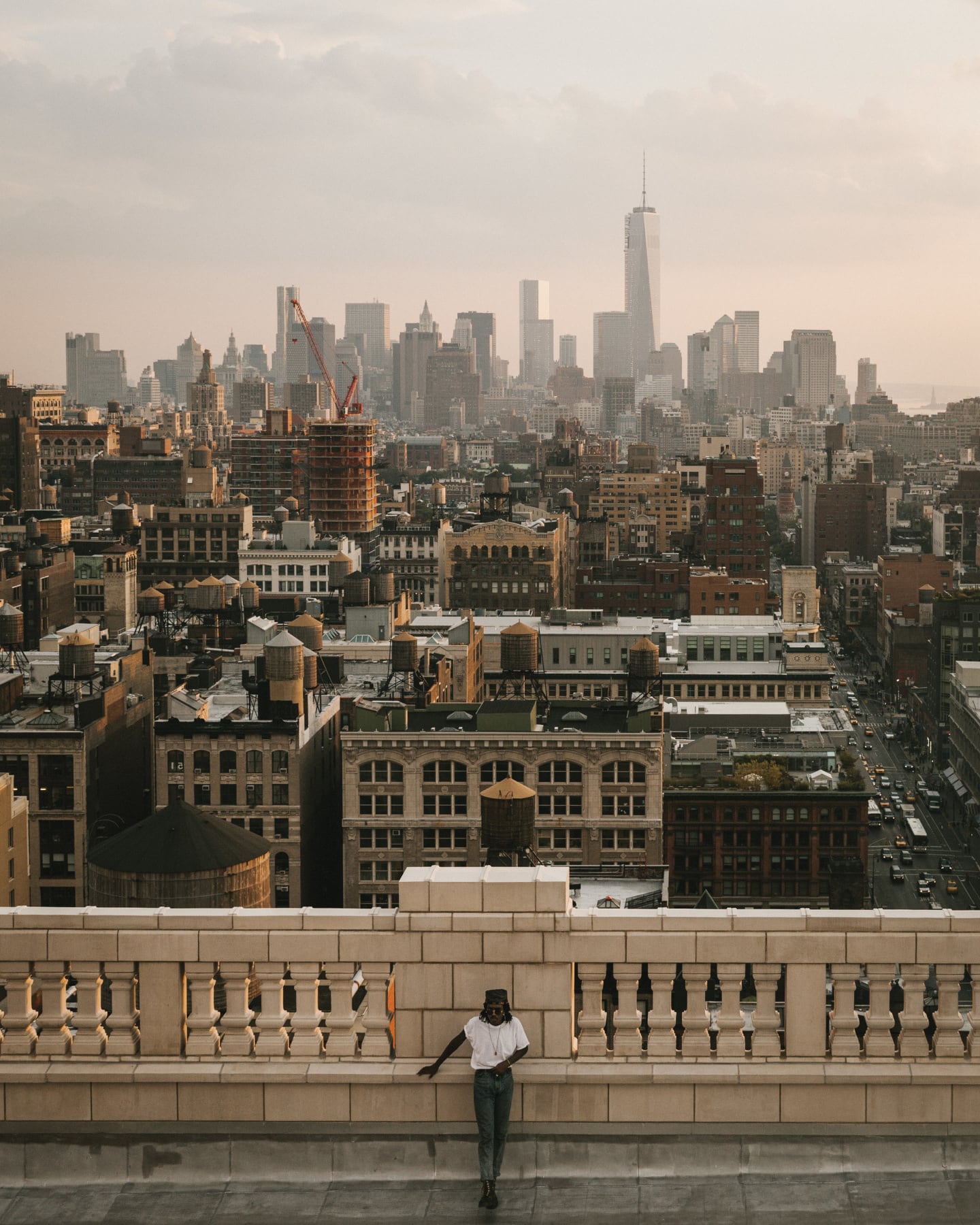Blood Orange’s Freetown Sound Is The Album For Fraught Times
Dev Hynes’s third album as Blood Orange was made by and for the black and queer communities that are most under attack in today’s fractured world.

If you’re anything like me — and particularly if you are brown or gay or black or female or Muslim or trans — you are likely waiting for the fever to break. We live in a time of Donald Trump and Brexit and HB2 and Orlando and heightened police brutality, on what seems like a sort of permanent, overheated, high alert. We react to crisis after crisis in real time, trying to anticipate and understand the fallout of each fresh wound, and then nervously waiting for the next tragedy to strike. It is frantic, and the cycle has come to be familiar. We discuss solutions, we go to marches hoping it will bring change, we call our senators, we donate money, we fight with people who disagree, but other times, more resignedly, we just sit in anxious stupor, staring at our Twitter feed, lonely and baffled that things ever got this bad. Some of us develop mental callouses, others pray for the temperature to lower, and many of us want to call in sick.
And then, at precisely the moment you might feel inclined to turn inward, along comes Dev Hynes like a cool, calming breeze. Hynes is originally a London boy, the son of a father from Sierra Leone and a mother from Guyana, who now lives in New York and has just released a fantastic new album, his third as Blood Orange, called Freetown Sound. It is, at first listen, a Xanax for these jittery days. But read more closely, it operates as a very complex repudiation of the ugly hate that encroaches on all of our lives. Freetown Sound is a black album, a gay album, a woman album, a brown album, an immigrant album, a trans album — it’s the soundtrack made by and for the very people that are now most under attack by idiots with guns and politicians with platforms. “My album is for everyone told they're not black enough, too black, too queer, not queer the right way, the under appreciated,” Hynes wrote in an Instagram post promoting the album. “It's a clapback." We are told, again and again, that our diversity is a risk — that immigration and different religions and disparate backgrounds bring only upheaval — but Freetown Sound is an artistic argument that is not, and has never been, true.
 Daniel Shea for The FADER, 2013
Daniel Shea for The FADER, 2013

The real proof of Freetown Sound’s intersectional beauty comes to life across its 17 songs. Hynes’s voice is the primary one we hear among the album’s loose coalition of collaborators, but he also gives space to forceful vocals from artists who aren’t always granted it. Ashlee Haze, a young black woman poet, is sampled on the album’s intro reading a poem about finding feminist strength and body confidence watching Missy Elliott videos as a child. On “Best to You,” my pick for a favorite song, we hear the echoing voice of Lorely Rodriguez, better known as Empress Of, the daughter of a Honduran immigrant mother. She sings a love song over a marimba that wouldn’t be out of place in a Steve Reich composition or at a street performance in Guatemala. In an interlude on “Desiree,” Venus Xtravaganza, the young trans woman at the heart of the legendary voguing documentary, Paris is Burning, holds court on how white women and women of color are viewed in our society. The song “Love Ya,” a cover of a song from his mother’s home country of Guyana, includes a sample of Ta-Nehisi Coates, perhaps the most eloquent intellectual we have at this moment on the subject of race and injustice, discussing how he navigates his own blackness in an unjust world. The song also features a clip of a woman from Sierra Leone speaking on the war and conflict in her country. On “E.V.P.,” the influence of the great gay musical pioneer Arthur Russell can be felt in its cello sections. And there’s a sample of the astute rapper Vince Staples on a song protesting police brutality, “Hands Up.” Freetown Sound is the best of us.
And then, of course, there is Hynes himself: the skinny, black, beautiful, queer maestro conducting all these disparate sounds and visions into a harmonious sonata. Hynes hasn’t always been so expansive an artist. On his first two albums as Blood Orange (2011’s Coastal Grooves and 2013’s Cupid Deluxe), as well as a number of marquee collaborations with Sky Ferreira (“Everything is Embarrassing”) and Solange (her True EP), he mastered a slinky, introspective aura, using sensual sounds inspired by Sade and Prince to create songs about lost love, depression, isolation, personal growth, and loneliness. But his artistic gaze seemed to turn more and more outward at the same time as many people of this generation: as the reality of police brutality — the deaths of Trayvon Martin, Freddie Gray, Sandra Bland, Eric Garner, and so many others — grew increasingly more visible to the general public. Hynes marched with Black Lives Matter, he tweeted copiously about injustice, he held two shows at the Apollo Theater to benefit the Harlem School of Music, and eventually, he released the song “Sandra’s Smile” in 2015 as a memorial to Sandra Bland and everyone lost to racism and white supremacy.
An evolved sense of inclusivity is not just apparent in Freetown Sound’s references and collaborators, it’s also been applied to its sound. Hynes has loosened the borders of genre wonderfully. He has often talked in interviews about being as equally interested in jazz, avant-garde classical, pop from around the world, R&B, and rap, but on Freetown Sound, he makes that free flow of styles a reality. Caribbean marimba slides through on “Best to You” and then butts up to a track that features Blondie legend Debbie Harry. Echoes of ‘90s hip-hop abound. There are moments of classic smooth jazz saxophone that you could imagine hearing played under a tunnel in Central Park, which is a reminder that there is something particularly New York about these overlapping voices. When I spent a week with Hynes in 2013 for a cover story in this magazine, he told me again and again that N.Y.C., perpetually called the “melting pot,” was his ultimate muse. While there are times when his best sonic ideas are muddled (“Chance” has a wonderful coda of a duet between Hynes and Kelsey Lu, but it comes after two minutes of murky navel-gazing), it doesn’t serve to undermine the whole because that is what happens when your ambitions are this wide. The unlikely competing layers of Freetown Sound, not unlike the endlessly zig-zagging density of New York, serve as a reminder that complexity is worthwhile even when it’s not always perfect.
It would be unfair to describe Freetown Sound as purely a project of identity politics — these songs are lovely, these artists insanely talented no matter where they are from, this work available to anyone who wants to listen. There has been chatter recently that identity politics have taken too central a role in our discussions of culture, that a generation now raised on pop academia and thinkpieces has begun to look at music as purely a political vessel, ignoring the actual art itself. All of this is worth considering: We would be wise to remember that identity politics is but one lens through which to view art, and sometimes it’s important to just listen to the cellos and the guitars and appreciate them for what they are.
And yet Freetown Sound reminds me that these two things — form and content — need not be opposed. Hynes has made an album that celebrates both the best of humanity and the best of music. It is a symphony that could not have been made by anyone but its diverse cast of characters, but one that stands aesthetically on its own; a complete, amazing work of art. Take a moment, as you listen to Freetown Sound, and just breathe in all its different voices. Without such unique individuals, we could never have anything this beautiful. So even if it’s a little optimistically naive to say so, I think that this is an album that shows us what the future could — and, even with these hateful hiccups along the way, unstoppably will — be like. And doesn’t it sound great?
 Daniel Shea for The FADER, 2013
Daniel Shea for The FADER, 2013
